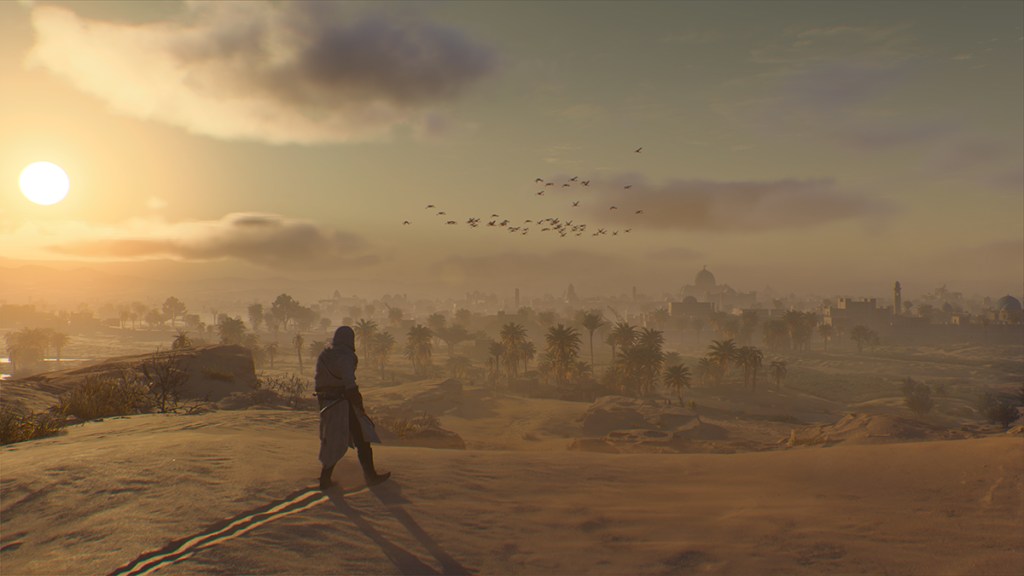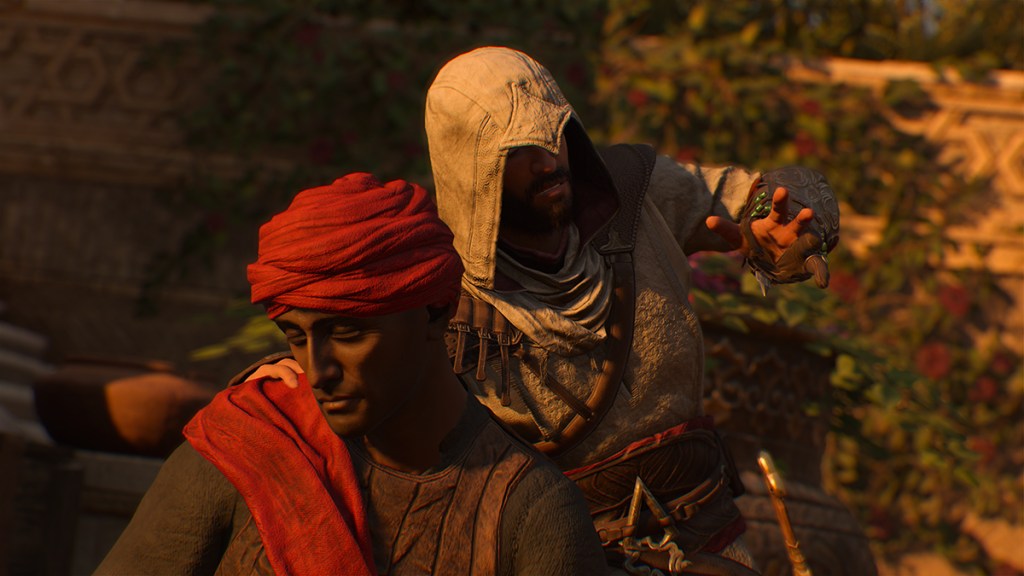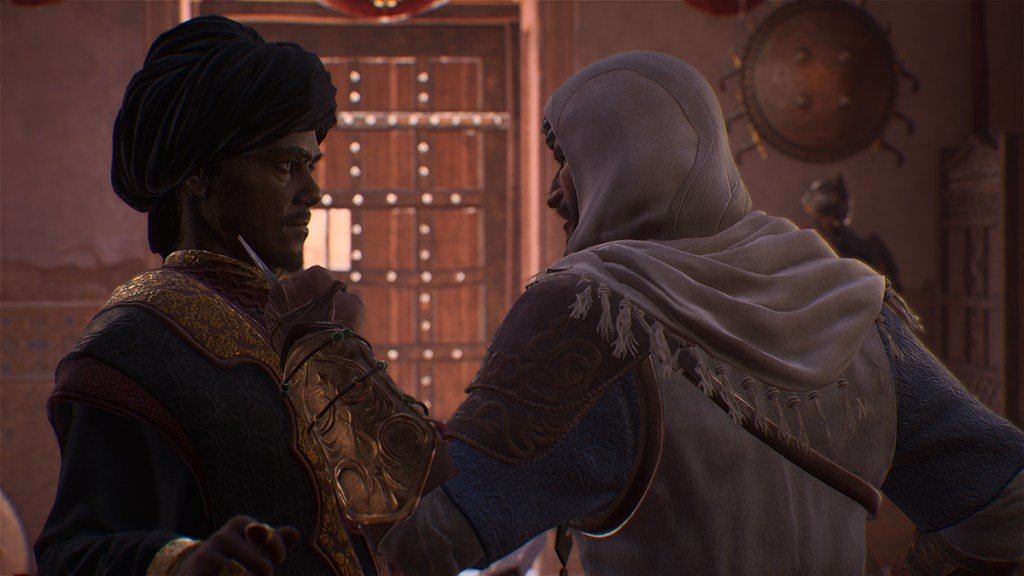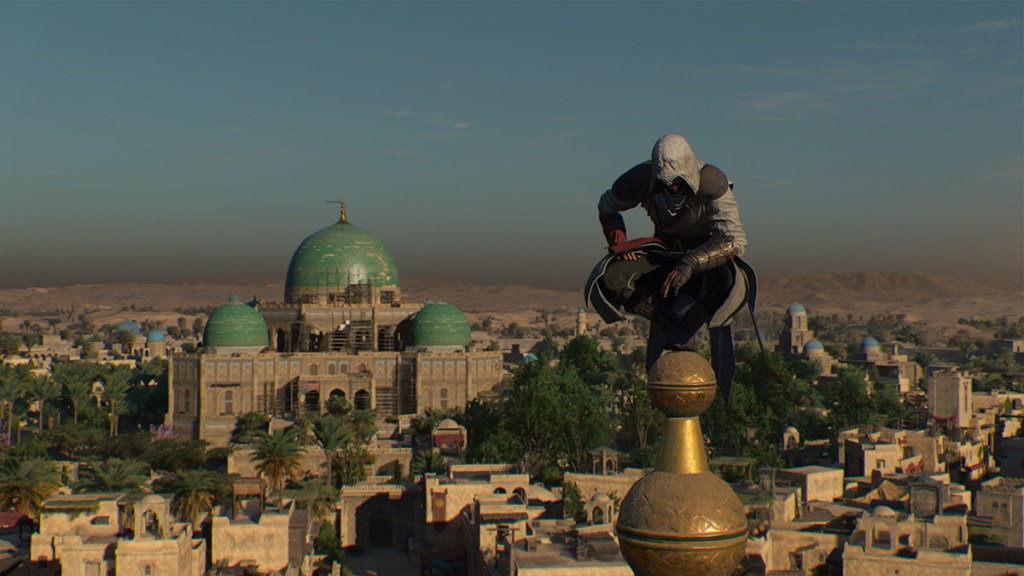The Assassin’s Creed theme swells in the intro montage for Assassin’s Creed Mirage that celebrates the franchise’s 15th anniversary. Bayek readies his bow. Eivor sprints into action. Arno is there out of a contractual obligation. It’s a collection of hooded figures that has taken millions of players to a few dozen historical settings and gotten the series where it is today.
But that is not an enviable spot to be in. Assassin’s Creed has become more and more bloated over the years and substituted innovation for more. More empty square miles. More meandering DLC. More looping storylines about an endless modern day conflict. The churn has meant Assassin’s Creed has long since lost its ability to lead and is merely content to follow dated trends and have shallow worlds as others like Sony, Nintendo, and Rockstar Games push forward. Mirage is meant to be the antithesis of this with its smaller scope and callbacks to the 2007 original, but is instead a slimmer version of all the same annoyances the franchise just can’t shake.

Those annoyances intertwine with its blandness and become the two sources of most of Mirage’s problems. Baghdad initially seems like a great setting for Assassin’s Creed, as the Middle East’s unique climate, architecture, geography, and wealth of cultures contrast nicely with the many European-centric locations seen in past installments. The richness of its culture is evident in its handful of disparate districts from the giant mosques to the smaller details like its gorgeous mosaics and rugs, all of which are explained wonderfully in its detailed codex. The Assassin logo in the home base that’s compiled of hundreds of lovely blue stones is the purest distillation of this effort to portray the beauty of ninth-century Baghdad.
But a lot of these efforts are betrayed by the hollow nature of its world. Baghdad is a checklist filled with elements borrowed from other Assassin’s Creed games, which makes it an unexciting place to wander around. Players are mindlessly guided toward map icons that are mostly just collectibles, and there’s little reason to stray from the designated breadcrumb trail. There aren’t any random, special, or surprising events that make the world feel alive.

It’s an artistically pretty yet predictable hub that’s treading water in the open-world design of yesteryear and ignoring the freedom (and level of quality) that other teams have been pursuing. Finding objectives isn’t engaging since the game goes out of its way to pinpoint them even with the underdeveloped “Unguided Objective” mode turned on, a feeble setting that has not evolved since Odyssey.
Its toolset is also limiting since there’s no unpredictability or room to experiment. Most of the side and main quests are the basic infiltration missions that have taken precedence in recent years where players are essentially given the same limited tools to do the same things against the same guards with the same shaky AI. It’s a sandbox with very little sand; ironic for a city surrounded by it.
Melee combat is lacking for its own reasons — there aren’t many options and even the most basic enemies strangely tank through slashes — but the stealth is most heavily impacted by the game’s static nature. Infiltrations aren’t satisfying since its small handful of possible entrances are often deliberately pointed out to the player. The aforementioned familiar toolset means there aren’t any new ways to dispose of threats. Crouching in waist-high grass, whistling to attract a guard, stabbing him, and then repeating that is not a loop that can sustain so many games, especially since Ubisoft has done little to expand upon it. It’s functional and periodically empowering, but those brief spurts of amusement are just a small oasis in a bone-dry desert.
Sneaking also doesn’t always go according to plan since Mirage is still heavily coated in the typical Assassin’s Creed bullshit that is as unspecific as it is infuriating. Enemies can occasionally see the player through walls or automatically detect them. A crucial throwing knife might not actually fire after releasing the trigger. Basim may get stuck on a small nub in the wall and fail to climb over it for no good reason. Mirage’s faithfulness to the past should not have included the aggravating control issues that have lingered in some form since the franchise’s inception.

Its narrative isn’t plagued by technical jank, but is yet another aspect that relies too heavily on what the series has done many times before. Basim’s journey to root out corruption in Baghdad is about as banal as an Assassin’s Creed story can be. Unmasking each one of its cartoonishly corrupt villains is a quick process that lacks any intrigue or surprises that differentiate them from one another. They all fall to Basim’s hidden blade shortly after being introduced and then it’s on to the next one.
The story’s attempts to speak to anything broader are lost in the predictable shuffle of crossing names off a board. Mirage flirts with questioning the hypocrisy of the brotherhood and how its quest for freedom robs its members of it, but this appealing idea is dropped almost as quickly as it is brought up.
Basim also lacks almost any personal stakes for this mission, making him a dull protagonist that misses what made Ezio, Bayek, and Kassandra so memorable. The nightmares that haunt him seem to be the team’s attempts at giving him a unique twist, yet this thread is inconsistently spread throughout the game. It doesn’t develop at all until the final cutscene where it rushes to an unearned climax that is almost unintelligible, especially for anyone who hasn’t studied some very specific parts of Assassin’s Creed Valhalla.
Assassin’s Creed Mirage Review: Final Verdict
While its brevity impedes the story, Assassin’s Creed Mirage is thankfully a lot shorter than the last few entries. However, its relatively slender figure only points out how the series has used quantity to overcompensate for its stagnation. This is laid bare in Mirage, as its stealth and open-world design all pull from eras that have long since fallen out of style — an unforced error that is mostly because of Ubisoft’s decade-long overreliance on that structure. Baghdad’s potential as a classic setting in the franchise has also suffered because of this and has been undermined by the artificiality of its blueprint. Mirage was designed to go back to basics, but it just ended up being too basic.
-
Baghdad is a unique location with lovely scenery…
-
…But is also a two-dimensional open world full of tired, boring tasks and mission types the series has used repeatedly
-
Combat and stealth mechanics are shallow and nothing the series hasn't done many times over
-
The by-the-numbers story lacks suspense and intrigue, and Basim is a shell of a protagonist
Disclaimer: This Assassin’s Creed Mirage review is based on a PS4 and PS5 copies provided by the publisher. Played on version 1.01 and 1.001.000, respectively.







